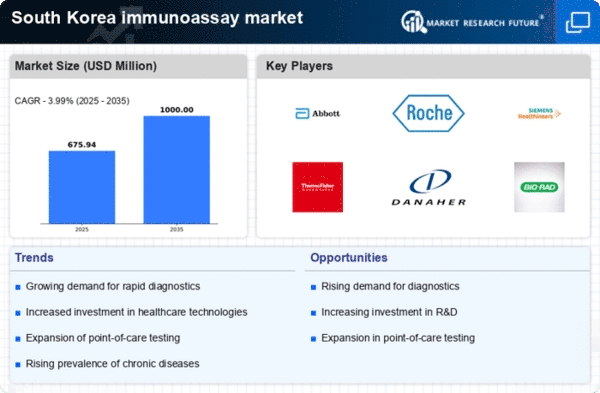Advancements in Diagnostic Technologies
Technological innovations in diagnostic tools are significantly influencing the immunoassay market in South Korea. The introduction of high-throughput screening methods and automated systems enhances the efficiency and accuracy of immunoassays. For instance, the integration of artificial intelligence and machine learning in diagnostic processes is expected to streamline operations and improve result interpretation. As of 2025, the market for diagnostic technologies is projected to grow at a CAGR of around 10%, indicating a robust demand for advanced immunoassay solutions. This evolution in technology not only boosts the reliability of test results but also expands the applications of immunoassays across various medical fields, including infectious diseases and oncology.
Increasing Prevalence of Chronic Diseases
The rising incidence of chronic diseases in South Korea is a pivotal driver for the immunoassay market. Conditions such as diabetes, cardiovascular diseases, and various cancers necessitate regular monitoring and early detection, which immunoassays facilitate effectively. According to recent health statistics, chronic diseases account for approximately 80% of healthcare expenditures in the country. This trend underscores the need for advanced diagnostic tools, as healthcare providers seek efficient methods to manage these conditions. The immunoassay market is likely to benefit from this growing demand, as healthcare systems increasingly adopt these tests to improve patient outcomes and reduce long-term costs associated with chronic disease management.
Rising Awareness of Preventive Healthcare
There is a notable shift towards preventive healthcare in South Korea, which is driving the immunoassay market. As the population becomes more health-conscious, there is an increasing demand for early detection and preventive measures against diseases. Public health campaigns and educational initiatives have raised awareness about the importance of regular health screenings, thereby promoting the use of immunoassays. This trend is reflected in the growing number of health check-up programs offered by hospitals and clinics, which often include immunoassay tests. The market is expected to expand as more individuals seek proactive health management solutions, leading to a higher adoption rate of immunoassay technologies.
Growing Investment in Healthcare Infrastructure
The South Korean government's commitment to enhancing healthcare infrastructure is a crucial driver for the immunoassay market. Increased funding for healthcare facilities and research institutions fosters an environment conducive to the development and adoption of innovative diagnostic solutions. In recent years, the government has allocated substantial budgets aimed at improving laboratory capabilities and expanding access to advanced diagnostic tests. This investment is expected to reach approximately $2 billion by 2026, reflecting a strong focus on modernizing healthcare services. As a result, the immunoassay market is likely to experience growth, as healthcare providers gain access to state-of-the-art technologies that improve diagnostic accuracy and patient care.
Expansion of Research and Development Activities
The immunoassay market in South Korea is significantly influenced by the expansion of research and development (R&D) activities. Academic institutions and private companies are increasingly investing in R&D to innovate and enhance immunoassay technologies. This focus on R&D is driven by the need for more sensitive, specific, and rapid diagnostic tests. As of 2025, R&D expenditures in the healthcare sector are projected to increase by approximately 15%, indicating a strong commitment to advancing diagnostic capabilities. This growth in R&D not only fosters innovation but also encourages collaborations between academia and industry, further propelling the development of novel immunoassay solutions tailored to meet the evolving needs of the healthcare market.
















